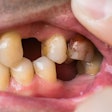
Performing good deeds, like driving a colleague to work in the morning or walking a dental assistant's dog while she's on vacation, helps the recipients and may improve the givers' well-being, according to a study published on September 3 in the Psychological Bulletin.
However, not all acts of kindness benefit givers equally. Demographics, such as age and gender, and the type of good-natured act performed affect how much it improves the giver's mental and physical health, the researchers found.
"The prosociality-eudaimonic well-being link was moderated by some unique variables of individual differences, such as age and percentage of female participants," wrote the group, led by Bryant P. H. Hui, PhD, from the University of Cambridge and the University of Hong Kong.
It's ugly
COVID-19 has brought out the worst in dentists and dental hygienists. They have clashed over personal protective equipment (PPE), schedules, and more. However, nobody ever comes out on top. The U.S. may be inching closer to a vaccine, or perhaps another medical breakthrough is around the corner. No one knows, but maybe it's time for everyone to raise their white flags and try a little kindness?
Previous studies have shown that people who engage in acts of kindness are happier and experience improved mental and physical health compared to those who don't partake in any prosocial behavior.
However, not all studies have led to that conclusion. To get a better sense of the connection between good deeds and improved well-being, Hui and colleagues analyzed 201 independent studies comprising 198,213 total participants.
What matters
Though the general link between prosocial behavior and well-being was modest, the connection was much stronger depending on the type of act. Casual acts of kindness, such as picking up a sick friend's medication, were more strongly connected to overall well-being than scheduled good deeds, such as volunteering at a soup kitchen, according to the authors.
Age and gender also showed a relationship to kindness and eudaimonic well-being, a term that refers to living a life of virtue in pursuit of meaning and purpose, as opposed to living life in search of positive feelings.
Younger givers experienced higher levels of overall well-being, eudaimonic well-being, and psychological functioning. Meanwhile, female givers experienced strong recuperative and beneficial effects in terms of psychological distress and physical health. Women who engaged in general helping and family helping had better social relationships and physical health, the authors wrote.
Limitations of the study included the fact that all participants analyzed were from North America, leaving out much of the world.
Road ahead
More research is needed and could focus on other factors, such as ethnicity and social status, that may affect the relationship between kindness and well-being.
Though the analysis revealed an overall modest association between prosocial behavior and better mental and physical health, the results remain useful, they wrote.
"There may be a valuable path toward well-being enhancement and sustainability," Hui and colleagues wrote.




















